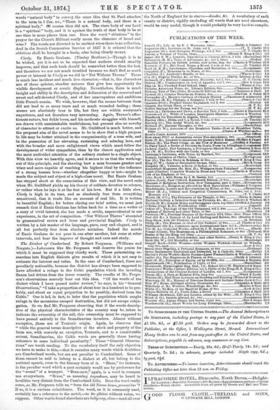The Dialect of Cumberland. By Robert Ferguson. (Williams and Norgate.) — Labourers
like Mr. Ferguson well deserve the praise for which it must be supposed they chiefly work. These painstaking re- searches into English dialects give results of which it is not easy to estimate the interest and value. In the case of Cumberland, these are peculiarly noticeable, because the district has always been supposed to have afforded a refuge to the Celtic population which the invading Saxon had driven from the lower country. The results of Mr. Fergu- son's observations scarcely bear out this idea. "Of the words of the dialect which I have passed under review," he says, in his "General Observations," "I take a proportion of about four in a hundred to be pro- bably, and about an equal proportion to be possibly, derived from the Celtic." One is led, in fact, to infer that the population which sought refuge in the mountains escaped destruction, but did not escape subju- gation. So we find Mr. Ferguson observing that if the words descrip- tive of the physical characteristics of the country may be,taken to indicate the ownership of the soil, this ownership must be supposed to have passed entirely to the Scandinavian invaders. Almost without exception, _these are of Teutonic origin. Again, he observes that "'while the general terms descriptive of the stock and property of the farm are, with scarcely an exception, Teutonic, and to a considerable extent, Scandinavian, the Celtic words are generally those having reference to some individual peculiarity." These "General Observa- tions" are worth reading. To the vocabulary itself the only objection we have to make is this,—that it contains many words which doubtless are Cumberland word; but are not peculiar to Cumberland. Some of them cannot be said to belong to a dialect at all, but belong to the national speech, even to the literary form of it. "Blare," for instance, is the peculiar word which a poet certainly would use by preference for the "sound" of a trumpet. "Bran-new," again, is a word in common use everywhere. "Brass," as meaning impudence, may be heard in localities very distant from the Cumberland hills. Does the word really come, as Mr. Ferguson tells us, " from the old Norse brass, procaci las "? If so, it is a curious coincidence. The word, as it is commonly used, certainly has a reference to the metal,—to its glitter without value, we suppose. Other words found elsewhere are bully-rag, clam—used all over the North of England for to starve—dander, dc. A vocabulary of each county or district, rigidly excluding all words that are used elsewhere, would be very useful, though it would probably be very hard to compile.






































 Previous page
Previous page